By Jordan Graham
Boston Herald.
Market turmoil that sent stocks plunging down and shooting back up has some tech investors and entrepreneurs keeping a watchful eye on Wall Street, as a reminder that the good times won’t last forever.
“It’s a reminder to people that the music can stop at any time, you’ve got to be building it the right way,” said Nick Rellas, chief executive of alcohol delivery startup Drizly. “We operate our business under the assumption that the money we have in the bank is the last money we’ll ever have.”
Stocks dove early last week, rebounding in recent days only after the Dow had fallen 1,900 points and the S&P 500 fell more than 10 percent for the first time in nearly four years. The volatility was largely driven by fears over the growth of the Chinese economy.
“You have to take an active, active role in making sure your financial house is in order,” Rellas said. “As a CEO I think it’s our job to take an interest in how the public markets are moving. … The Chinese can have an effect on how Drizly is working,”
Privately held companies are more protected from everyday swings in the market, but many startups prioritize adding users and customers over making profits. If venture capital dries up during a downturn, the companies with strong revenue and profits will be in the best position to ride out the wave.
“This is just a very valuable illustration of what we should have been keeping in mind all year,” said Rob Day, a venture capitalist focused on sustainable technology with Black Coral Capital. “It’s time to start focusing on what is your path to sustainable business,”
Venture capital fundraising has risen to enormous heights recently. According to venture capital tracking firm PitchBook, $1.6 billion was invested in Boston in the second quarter of the year. More than $9 billion was poured into startups in Silicon Valley. One California company, Slack, has raised closed to $300 million from venture capitalists. Its CEO has said the company hasn’t touched the money, and is saving it for a downturn.
Still, some said they are not concerned about the ups and downs in the markets.
“You can only worry about things you can impact, and this is one that you can’t,” said Jordan Fliegel, chief executive of CoachUp, which connects athletes with private coaches.
Bob Davis, partner at VC firm Highland Capital, said the firm’s investments aren’t going to be effected by a minor blip.
“We’re looking for a return on that six, seven, eight years down the line,” Davis said. “We always advise companies to be smart. That’s not any more true today than it was a year ago.”














































































































































































































































































































































































